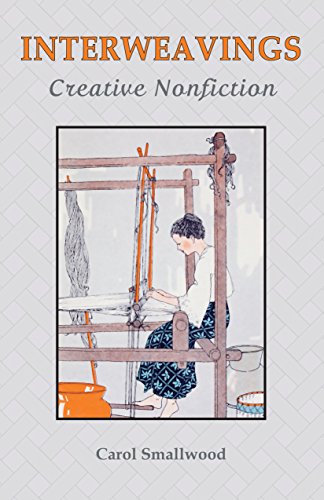|
Nicole Sparling Barco, Ph.D. Associate Professor of World Literature Central Michigan University Book Review: Interweavings, by Carol SmallwoodInterweavings, by Carol Smallwood Shanti Arts Publishing, Brunswick, Maine, 2017 ISBN 978-1-941830-46-8 paperback, $16.95, 162 pages. https://www.amazon.com/Interweavings-Creative-Nonfiction-Carol-Smallwood-ebook/dp/B06XFP3RTW/ref=sr_1_3?s=books&ie=UTF8&qid=1507324330&sr=1-3&keywords=carol+smallwood Carol Smallwood’s newest work, Interweavings: Creative Nonfiction, provides an essential perspective of the fabric life, by not only articulating its common threads, but also the spaces between them. Replete with nostalgia, reminiscence, and ritual, Smallwood’s stream-of-consciousness style prose collects lost objects and holds on to forgotten experiences, integrating them into a contemplative still life. For readers, a visit the library, the post office, or the hardware will never be the same, as Smallwood’s seemingly ordinary landscapes are transformed into sacred and meditative spaces. Indeed, Interweavings gives the impression of being suspended in time, of living in between, of a period of transition, of a thin space. A common thread throughout Smallwood’s writing is her attempts to grapple with the experience of having lived in and “being suspended between the prefeminist and postfeminist modern world” (53). Throughout this collection, questions of femininity and feminism are brought to light in relation to gender norms, sexual violence, education, autonomy, aging, and time. Smallwood was “born and raised in the world before Vatican II—in a culture that ran on top-down authority (a term I first heard in another class), before the conflict in Vietnam as well as the civil rights and women’s movements, before the media exposed presidents’ affairs, before men stopped opening doors for women—an era fondly called the good old days” (111), but does not accept that the “good old days” were indiscriminately good. Nonetheless, she finds comfort in secular rituals that embody her ethics, which ultimately reject a postmodern media-driven consumer culture. Like a librarian, Smallwood collects, catalogues, and preserves a cultural and intellectual heritage, and guards her truth.
0 Comments
Leave a Reply. |

 RSS Feed
RSS Feed